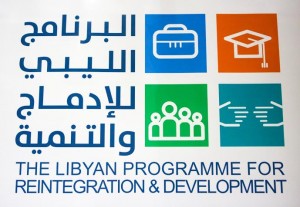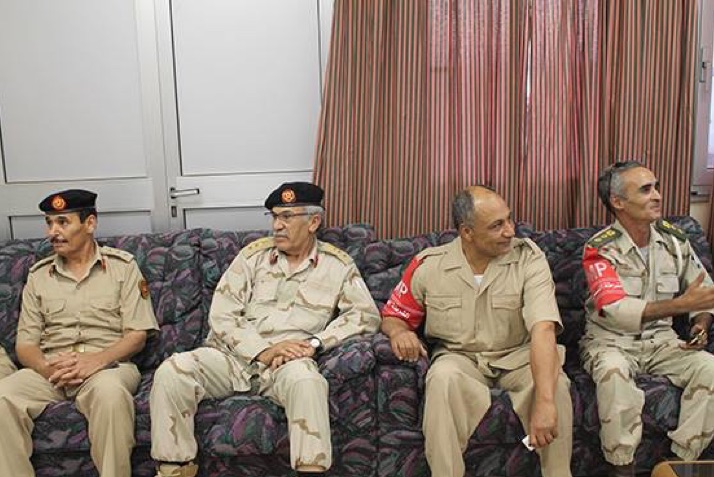By Saber Ayyub.

Tripoli, 15 July 2015:
The Libyan Programme for Reintegration and Development (LPRD) has released a progress report on its . . .[restrict]activities for the period 2011-2015 including some of the obstacles that have faced it in its aim to reintegrate Libyan fighters into civil society.
The rebranded LPRD was formerly known as the Warriors Affairs Commission (WAC) before a change of image was launched in March 2014.
In assessing its own performance, the LPRD agrees that it could have achieved more if the circumstances would have been more positive and stable in Libya. But given the circumstances, it feels that it has actually achieved some impressive results.
”A lot of frustration amongst LPRD participants also arose from the fact that institutions delayed or cancelled reintegration programmes into the security sector (army and police). We are hopeful that this will change once a Government of National Accord is put in place – to then unite forces to thrive for a peaceful and prosperous Libya’’, Mustafa Sagezli, the head of the LPRD told Libya Herald.
‘‘As the Progress Report lays out, the LPRD has achieved a lot over the last three years, but we obviously have more to do. Reintegrating all former revolutionaries will not happen overnight – yet in partnership with Libyan and international institutions we will achieve our goals.”
In its report released on 9 July, the LPRD claims that it has registered over 162,000 former fighters who were interviewed by social and psychological experts. It also reports that it has established a network of 31 branch offices across Libya to provide nationwide training and support.
It says that 60,000 ex-fighters went through its elementary awareness courses covering religious and cultural tolerance, and political understanding.
It has also awarded learning scholarships to 5,000 fighters and aappointed the same number to work in the new governmental security boards, explained Sagezli.
“We have found that many of them are in need of urgent psychological treatment while others have already passed the age of 40 without being married. On the basis of this, we have setup a project we called “Mouda” aiming to provide them with what they need to get married. We have also established four psychological support treatment clinics inside Libya” Sagezli added.
The main goal of the LPRD is to reintegrate former combatants into Libyan civil society. The focus of the programme is in offering education and training, creating job opportunities, and integrating revolutionaries into state and private institutions.
The LPRD was keen to stress that it has never had the mandate nor the state-wide support to run a disarmament programme, but agrees that it is normally a critical component of a reintegration programme in formerly civil war struck areas.
While disarmament may not be the mandate of the LPRD, it would be fair to say that to a large extent, the political and military split in Libya caused by militias refusing to succumb to the elected authority of Libya, has been caused by the failure of the successive Libyan government and the international community to implement a demobilization and disarmament programme for the militias.
However, even judging the work of the LPRD outside demobilization and disarmament, the organization does not seem to have succeeded in attracting enough militia-men to its programmes.
This may be a failure of the Libyan government to offer enough funding and attractive enough packages in relation to the scale of the problem of militias and their effect on the whole stability and existence of the Libyan state.
While the international community were very much prepared to offer great military help in the actual military overthrow of the Qaddafi regime, they have not been as proactive in enforcing an early demobilization and disarmament policy in Libya after military operations had ended.
This gap in the full-scale and deep implementation of demobilization and disarmament has enabled the militias to become a power unto themselves that ultimately challenged the political supremacy of the Libyan electorate in July 2014 by overthrowing the newly elected parliament, the House of Representatives.
Sagezli seems to blame this on the lack of government political and financial backing as well as the political and military split of the country.
It is true that successive governments have been either unable or unwilling to get behind WAC and the LPRD. The Ali Zeidan government failed to fund WAC with a huge budget in fear of the money ending up in the pockets of the militias as opposed to in DDR programmes.
With Libya’s state institutions being weak it was feared that there would be no state control of any money allocated to WAC.
Sagezli refutes this, telling Libya Herald that although the LPRD may not have received all the funding it had wanted from the Zeidan government, Zeidan was in support of the programme. Equally, ‘’given the responsible business practices we have established from day one on paying money to anybody’’, claims of any unaccountable money are totally unfounded.
Equally there were fears that the nearly a quarter of a million who registered as being ex-fighters were not all genuine ex-combatants but made up of opportunists trying to cash-in.
The LPRD says that it has received in total only LD 187 million of funds from the government. It says it has spent LD 69 million and LD 118 million are sitting in its bank accounts for spending on further projects after Libya’s political crises is resolved.
The LPDR believes that it has given good value for money in what it has delivered to date to the Libyan public for the LD 69 million it has already spent.
“We are a governmental organization and we are under the supervision of the Audit Bureau of the government” Sagezli said, keen to show that their activities are under state supervision.
“Equally, due to our open door policy for any investigations, we have contracted with a Libyan NGO specialized in transparency and anti-corruption to investigate, without prior notice, our financial affairs,” he added.
“I believe that the national dialogue and social peace are the real basis of establishing any strong and stable country’’, Sagezli said regarding the current Libyan situation and showing a full backing for dialogue as the only solution.
UN-led dialogue between the two main camps has been ongoing and an initial agreement has been signed by most, but not all of the antagonists.
‘‘To achieve this we are working to help any person who shared in liberating his country to reintegrate and share in building in his civil society,” concluded Sagezli. [/restrict]







